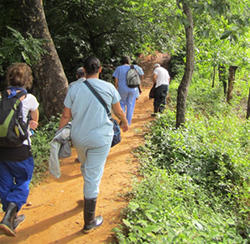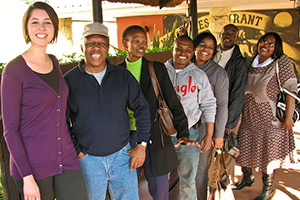
Globetrotting and Problem Solving
Summer is a time of individualized, experiential learning for master’s students in the Department of Maternal and Child Health (MCH) of UNC-Chapel Hill’s Gillings School of Global Public Health. The summer after their first year in the program, MCH students are required to complete an eight-week practicum, which provides students with opportunities to strengthen their competencies and apply their academic training in practical ways. These internships vary from positions at local health departments to national nonprofits and overseas organizations.

Members of the Collaborative Sasha Health Initiative hike to survey households in Nicaragua.
Last summer, two MCH students, Zahra Reynolds and Hannah Spector, pursued international opportunities. Reynolds says, “Although the practicum doesn't have to be abroad, my interests, which are international family planning, HIV and maternal health, naturally lend themselves to overseas work. I've worked in international health before, so I felt that my graduate school experience wouldn't be complete without an international practicum.”
Reynolds spent her summer in Maseru, Lesotho with the Lesotho Network of AIDS Service Organizations (LENASO), a small nonprofit organization that serves as the umbrella body for HIV/AIDS civil society organizations in the country. She explains, “The crux of my work was creating technical documents for the implementation of their new prevention of mother-to-child transmission project to include a survey to assess why Basotho women continue to give birth at home. I also worked on other projects, which included creating publicity materials as well as designing a logo and an organizational website.”
Meanwhile, Spector worked on the public health surveillance project in El Sauce, Nicaragua, with the Collaborative Sasha Health Initiative, a consortium of UNC-Chapel Hill medical, nursing, public health and geography students. Before the trip, the students purchased much-needed medical supplies for the El Sauce Health Center, where they volunteered and shadowed nurses. These supplies were purchased with money raised from selling organic, fair-trade coffee during their spring semester at UNC-Chapel Hill.
In Nicaragua, the team administered questionnaires in Spanish about topics such as prenatal care and family planning. Spector recalls the adventurous nature of her daily work routine. “Every morning, we would wake up early, put on our tall rain boots and hop on the back of a pick-up truck; to get to some of the houses in the communities we surveyed, we had to cross rivers and hike for hours.”

Reynolds (left) with her colleagues at the Lesotho Network of AIDS Service Organizations (LENASO).
Conversely, Reynolds spent a majority of her internship in an office environment. She was inspired by the dedication of her coworkers. “I loved just being in an environment where everyone was so passionate about the work they were doing. The team kept coming to work for months without getting paid while waiting for a grant to be dispersed, because they saw the importance of their work.”
Both students received the Maternal and Child Health Global Health Internship Award, a travel grant that they both say was instrumental in helping them achieve their summer pursuits. Reynolds says that she would not have been able to afford to go overseas without it. Spector adds, “It was a generous award of $1000 to support travel and living expenses, and it’s funded through alumni donations. I think we might see more MCH students complete practicums abroad if there were additional funding available to support these activities.”
Overall, Reynolds and Spector say that these internships reinforced their interests to pursue international health work after they graduate in May. Reynolds says, “I definitely want to do something in global health; this experience cemented that. It made me realize the impact I could have on other people's lives, and that there's so much work that needs to be done internationally.” Spector adds, “I witnessed first-hand several public health problems in the developing world, like what happens when you don't have electricity or running water. Learning what it is like to do research in a developing country was an invaluable experience and a total adventure.”
♦ Enelda Butler


